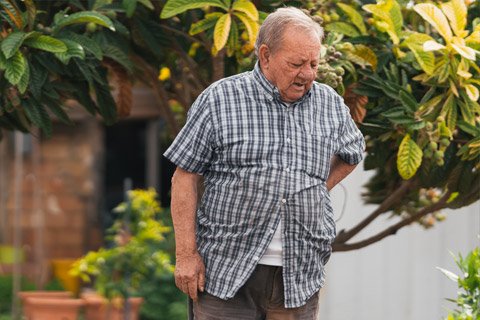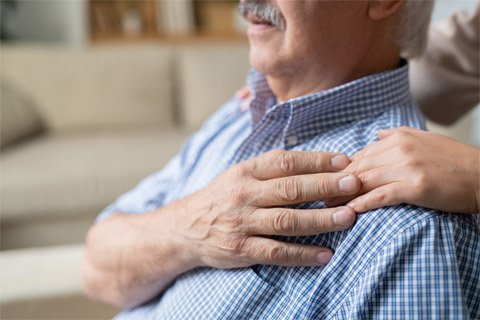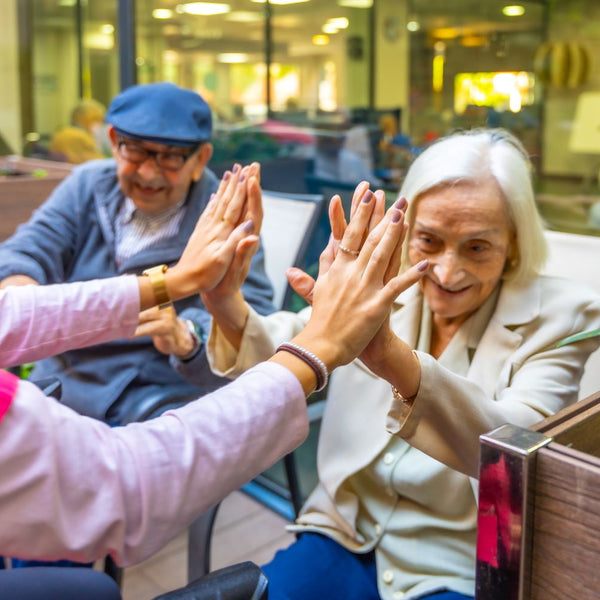As the human body ages, it’s going through numerous changes, both inside and out. From the visible signs in later life, like greying hair and wrinkles, to the less obvious shifts in metabolism and digestion, getting older can have an impact on many aspects of our health and wellbeing.
During the ageing process, our body also changes its nutritional needs, requiring different vitamins and other substances to keep vital and healthy. Unfortunately, the changing nutritional needs can sometimes lead to malnutrition – a condition where the body doesn’t get enough essential nutrients to function properly.
In this article, we’ll look at the causes of malnutrition in the elderly, explain how to recognise the main signs of this issue and provide helpful tips on how to prevent it.
Jump to:
- What is malnutrition?
- Causes in malnutrition in older adults
- Main signs of malnutrition in elderly people
- Consequences of malnutrition in elderly people
- Treatment for malnutrition in elderly people
1. What is malnutrition?
Malnutrition means our body doesn’t receive an adequate amount of certain nutrients to maintain good health and function properly. These essential nutrients can include:
- Proteins
- Carbohydrates
- Fats
- Vitamins
- Minerals
Malnutrition is a common health issue across all age groups, but it can be particularly concerning in the elderly, as it weakens the immune system, increases the risk of falls and fractures, and can contribute to other health problems.
It’s also important to note that malnutrition can affect individuals regardless of their body weight. For example, while some older adults may appear overweight or obese, their bodies might be still malnourished due to a lack of essential nutrients in their diet.

2. Causes of malnutrition in older adults
There’s a whole variety of factors, both physical and social, causing malnutrition in the elderly. Some of the most common causes include:
Loss of appetite
Poor appetite is a common condition in elderly people and one of the major causes of malnutrition. As we age, our ability to taste and smell decreases, directly affecting our feelings of hunger and desire for food.
Additionally, loss of appetite in the elderly often goes hand in hand with certain medical conditions and medications. From chronic illnesses, such as cancer, diabetes or heart diseases, to short term sicknesses, such as cold, flu or migraine, all these conditions can significantly reduce people’s appetite, making it challenging to maintain a healthy, balanced diet.
Dental problems
From tooth loss to gum diseases and poorly fitting dentures, dental issues can make chewing difficult and painful, discouraging older adults from eating and potentially causing malnutrition over time.

Digestive problems
Similarly, digestive issues can turn eating into an uncomfortable, or even painful process, lowering elderly people’s appetite or willingness to eat a balanced diet and reducing their intake of essential nutrients.
Whether seniors suffer from indigestion, constipation, or simply have difficulty swallowing, all these digestive problems can significantly limit their food choices and increase the risk of malnutrition.
Limited mobility
While limited mobility might not seem like an obvious factor contributing to malnutrition, its negative impact on healthy diet in elderly people shouldn’t be underestimated. In fact, mobility issues and physical disabilities can make it difficult for older adults to access groceries, reach into cupboards or the back of the fridge and affect their ability prepare healthy meals, leading to nutritional deficiency.
Social isolation
Eating is frequently seen as a social activity, making the meals tastier and more enjoyable when shared with others. Unfortunately, with a number of elderly people living alone and experiencing social isolation, it is common for them to lose interest in meal preparation or eating itself to some degree, often leading to poor dietary habits and even malnutrition.
Financial constraints
The rising costs of groceries and limited financial resources can prevent older adults from buying nutritious food and accessing healthy meals. From lean protein sources, fresh produce and whole grains, the prices of all these ingredients continue to rise, forcing seniors with financial constraints to rely on cheaper and often much less nutritious options.
Mental health issues
Finally, depression, anxiety, and other mental health issues in the elderly can have a significant impact on healthy appetite and food intake, potentially leading to malnutrition if not addressed.
3. Main signs of malnutrition in elderly people
Detecting malnutrition in elderly people can be challenging, as signs and symptoms might be subtle and can be attributed to other health conditions or ageing itself. However, these are some of the most common signs of malnutrition in the elderly you should be vigilant for:
- Sudden or dramatic weight loss
- Fatigue and weakness
- Decreased muscle mass
- Cognitive decline
- Delayed wound healing
- Decreased immune function and vulnerability to viruses and infections
- Hair loss
- Dry skin
- Irritability and mood swings
Not all malnourished older adults will suffer from the symptoms mentioned above and the presence of some of these signs might not necessarily indicate malnutrition. However, prevention and early detection are key when it comes to malnutrition, making it easier to maintain seniors’ health and restore their vitality. This is why it’s important to encourage your older loved one to see a medical professional if you are worried about malnutrition or any other aspect of health and wellbeing.
4. Consequences of malnutrition in elderly people
Whether our bodies lack the right balance of proteins, fibre, vitamins or minerals, long term malnutrition can have a serious impact on our overall health and wellbeing. With increasing age, it’s even more important than ever to provide our body with nutrients essential to function properly and help protect against illnesses and chronic diseases.
In simple terms, malnutrition in advanced age can significantly weaken an older adult, affecting various aspects of physical and mental health and leading to a variety of consequences, including:
Weakened immune system
As already mentioned, malnutrition in the elderly compromises the immune system, leaving older adults more prone to infections, illnesses and other health complications. This can result in more frequent and severe bouts of sickness, prolonged recovery times and increased risk of hospitalisation.

Falls and fractures
Malnutrition in elderly people can also weaken muscles, impair balance and reduce bone density, increasing the risk of falls and fractures occurring if they do have an accident. When older adults experience a fall, the consequences can be severe, from permanently impacting the person’s mobility to losing the confidence to move safely. To find out more about falls in elderly and learn how to prevent them, you can read our article about the common types of falls in elderly people.
Increased risk of common heart diseases
Poor diet and lack of essential nutrients can also increase the risk of cardiovascular diseases, such as high blood pressure and coronary artery disease. Malnutrition can also lead to elevated levels of cholesterol, increasing the risk of stroke and heart attack. To learn more about the cardiovascular system and keeping it healthy in later life, you can read our article on common heart problems in elderly people.
Cognitive decline
Nutrient deficiencies, particularly lack of B12, D and E, have been linked to cognitive decline and an increased risk of neurodegenerative diseases, such as Alzheimer’s disease and dementia. Malnourished seniors can also experience memory problems, confusion and have difficulty concentrating if their body isn’t getting everything it needs to be healthy.
Mental health problems
Finally, maintaining good mental health is crucial for the overall wellbeing of older adults, and nutrition plays a significant role in supporting cognitive function, mood regulation and social interaction. For instance, omega-3 fatty acids, iron, magnesium and vitamins B, C and D are particularly important for brain health, lowering the risk of anxiety and depression in older age individuals.

5. Treatment for malnutrition in elderly people
When spotting the first symptoms of malnutrition, it’s crucial to take immediate action and prevent the condition from further impacting the person’s health.
- If you suspect malnutrition, make sure to first contact your GP to discuss the symptoms and seek further advice. Healthcare professionals typically carry out blood and urine tests for general screening and monitoring, inspecting various markers of nutritional status and overall health.
- As part of the medical checks, doctors might also check whether there is difficulty in digesting certain foods, such as gluten or dairy products, addressing potential food intolerances or allergies that might have developed in later life.
- Based on the medical test results, the health professional might then recommend dietary modifications and supplements to address malnutrition and support a healthy, balanced diet.
Additionally, lifestyle changes, such as increasing physical activity, improving mealtime habits and managing stress, can play an important role in supporting overall wellbeing and nutritional balance.
Some of the recommendations to prevent malnutrition in elderly include:
- Being physically active to stimulate appetite and improve digestion
- Following a consistent mealtime schedule to establish a healthy routine
- Opting for smaller, more frequent meals throughout the day. See our guide to healthy snacks for elderly people
- Increasing the amount of fresh produce, whole grains and lean protein sources in the diet
- Cutting down processed foods and foods high in salt, sugar and sodium
- Drinking plenty of water to prevent dehydration
- Managing stress and getting adequate, healthy sleep
- Practising mindfulness activities, such as yoga or meditation, or spending more time outdoors to promote relaxation and improve appetite
If you’re looking for more inspiration for healthy, balanced meals for seniors, you can read our ultimate guide to meal prepping for older adults.
While embracing healthy lifestyle changes, make sure your elderly close ones attend regular medical check-ups. Whether it’s for preventive screening, managing chronic conditions or addressing emerging health concerns, regular medical assessments help you detect any issues early on and receive the necessary support to stay active and healthy in advanced age.
If you’re concerned about your elderly relatives' health and safety when you’re not there with them, take a look at our extensive range of personal alarms and home monitoring systems - small devices assisting seniors with independent living while giving peace of mind when you can’t be around.




